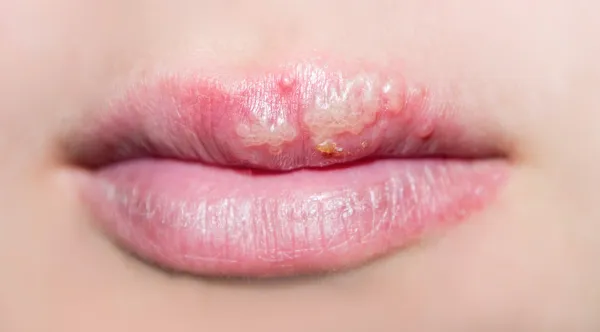Share this @internewscast.com
Yes, a strong immune system can definitely impact the herpes simplex virus (HSV) in several ways.
Herpes simplex virus (HSV) lurks within a staggering two-thirds of the global population, a silent guest in many but a formidable foe for some. While most experience occasional cold sore flare-ups, HSV can unleash a more aggressive side, causing severe eye infections and even brain inflammation. This viral threat has long piqued the curiosity of researchers, who’ve been locked in a quest to understand how our immune system manages this delicate dance of containment.
A recent breakthrough from Harvard Medical School illuminates the cellular battlefield where this war is waged. The study reveals a crucial player: interferon, a distress signal released by the immune system upon sensing HSV’s presence. This alarm call triggers a cascade of reinforcements, summoning a protein warrior named IFI16 to the cell’s nucleus, the virus’s intended replication ground.
IFI16, a skilled strategist, adopts a multi-pronged approach to keep the virus at bay. Its first line of defense is a molecular shield constructed around the viral DNA, effectively imprisoning it and preventing it from replicating. But the virus, a cunning opponent, isn’t about to surrender. It deploys its own arsenal of proteins, attempting to dismantle the shield and break free.
The battle hinges on a delicate balance. In the absence of sufficient IFI16 reinforcements, the virus gains the upper hand, wreaking havoc within the cell. However, when interferon sounds its alarm, the tide turns. Additional IFI16 troops are summoned, bolstering the defenses and tipping the scales in favor of the immune system. This successful containment keeps the virus dormant, preventing its outward manifestations.
The significance of this discovery extends far beyond the realm of cold sores. IFI16’s defensive tactics offer valuable insights into combating a wider range of viral foes that target the cell’s nucleus. This knowledge could pave the way for developing treatments against other notorious viruses like Epstein-Barr and hepatitis B, which share similar cellular battlegrounds.
While the path towards effective therapies is still being paved, this research marks a significant leap forward in understanding the intricate dance between the immune system and viral adversaries. It’s a story of constant adaptation and counter-adaptation, a testament to the resilience of both human biology and the persistent quest for scientific understanding. The battle lines may be drawn within the microscopic realm, but the implications resonate on a global scale, offering hope for a future where even the most stubborn viral enemies can be brought to heel.
How strong immune system impact Herpes simplex virus

1. Reducing severity and frequency of outbreaks: People with strong immune systems generally experience milder and less frequent outbreaks of HSV symptoms, such as cold sores or genital herpes. This is because the immune system can effectively control the virus and prevent it from replicating to a significant degree.
2. Keeping the virus dormant: A robust immune system can keep the HSV virus in a latent state, meaning it remains inactive within the nerve cells without causing any noticeable symptoms. This is the ideal scenario for most people with HSV, as it minimizes the impact of the virus on their daily lives.
3. Shorter duration of outbreaks: When outbreaks do occur, a strong immune system can help them resolve faster and with less discomfort. This is because the immune system can quickly fight off the virus and reduce inflammation.
4. Reducing the risk of complications: In some cases, HSV can cause serious complications like meningitis or encephalitis, especially in individuals with weakened immune systems. A strong immune system can significantly reduce the risk of these serious complications.
However, it’s important to remember that having a strong immune system doesn’t guarantee complete protection against HSV. The virus can still be transmitted even to people with robust immune systems, and stress, illness, or other factors can trigger outbreaks even in individuals with good immune health.
Here are some ways to strengthen your immune system and potentially help manage HSV:
- Eat a healthy diet rich in fruits, vegetables, and whole grains.
- Get regular exercise.
- Get enough sleep.
- Manage stress effectively.
- Practice good hygiene to avoid triggering outbreaks.
- Talk to your doctor about any supplements or other immune-boosting strategies that might be helpful for you.
Here are some common signs of HSV infection
Oral Herpes (HSV-1)
Read Related Also: 15 Subtle Signs Your Body Is Aging Faster Than You Are
-
Tingling or burning sensation around the lips or mouth
-
Small, fluid-filled blisters that develop into painful sores
-
Scabs that form over the sores
-
Fever, swollen lymph nodes, and general malaise, especially during the first infection
Genital Herpes (HSV-2)
-
Blisters or sores on the genitals, buttocks, or thighs
-
Itching, burning, or pain in the affected area
-
Painful urination
-
Vaginal discharge in women
-
Flu-like symptoms, similar to oral herpes, during the first outbreak
Other Signs
- Eye infections (herpes keratitis): Redness, pain, blurry vision, and light sensitivity
- Meningoencephalitis (brain inflammation): Fever, headache, confusion, and seizures (rare)
- Finger herpes: Blisters or sores on the fingers, usually from contact with infected skin or saliva
It’s important to note that:
- HSV symptoms can vary in severity and duration.
- Some people may experience mild or no symptoms at all, even though they are infected with the virus.
- Symptoms can recur periodically, triggered by stress, illness, or other factors.
Key Takeaways
- The immune system uses a protein called IFI16 to combat HSV within the cell’s nucleus.
- Interferon acts as a distress signal, summoning IFI16 reinforcements.
- IFI16 builds a protective shield around viral DNA, preventing replication.
- The virus employs countermeasures to dismantle the shield.
- Understanding IFI16’s tactics could lead to broader antiviral treatments.
Key Points
- Herpes simplex virus (HSV) is a common but potentially dangerous virus.
- The immune system uses a protein called IFI16 to fight HSV within the cell’s nucleus.
- Interferon signals recruit more IFI16, tipping the balance in favor of the immune system.
- This research could lead to new treatments for HSV and other nuclear DNA viruses.
Continue to check our website Celeb99.com for more articles of this kind. And, please use our comment section as well, we would love to hear from you.











